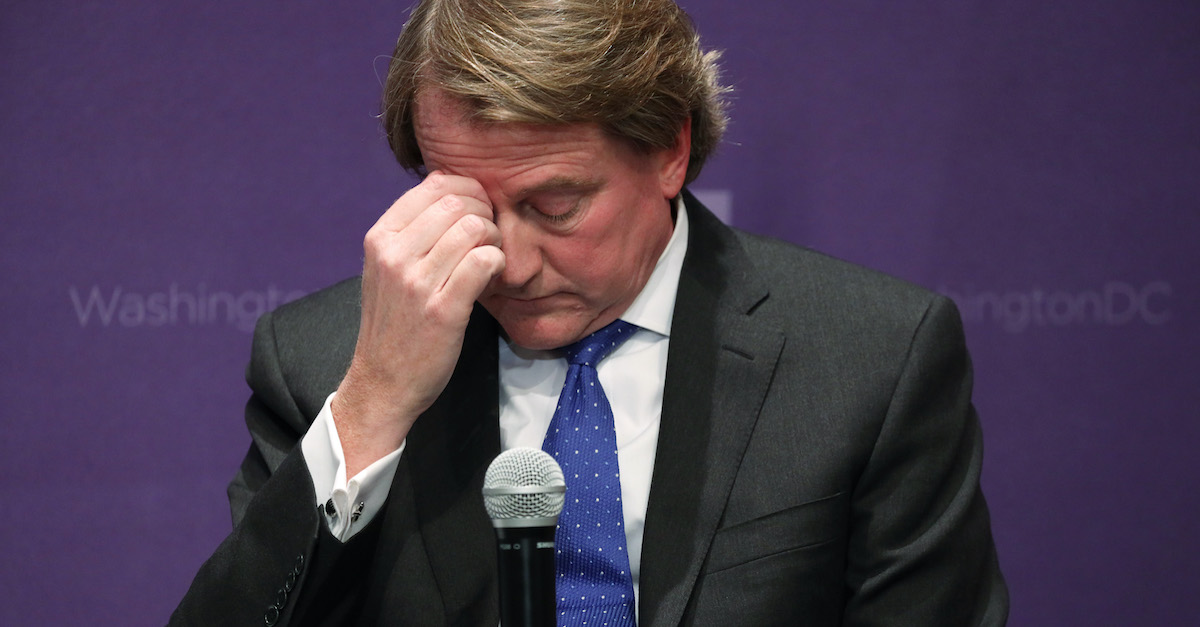
When former White House counsel Don McGahn left the Trump administration in late 2018, he was reportedly “barely on speaking terms” with President Donald Trump. After nearly two years serving as the top attorney for one of the most embattled administrations ever, what finally drove McGahn out wasn’t the special counsel’s Russia investigation–it was the president granting clemency at Kim Kardashian’s request, according to a new book chronicling the administration.
In his latest book “Donald Trump v. the United States,” Pulitzer Prize-winning New York Times journalist Mike Schmidt revealed several extraordinary details about McGahn’s finals days in the White House. During his time as White House counsel, McGahn helped Trump select and confirm a slew of federal judges that will influence a generation of jurisprudence. According to the Mueller report, McGahn declined to carry out directives from the president which may have constituted obstruction of justice.
The Schmidt book begins with its author “chasing down” McGahn outside of the White House. McGahn admitted that his work as White House counsel “damaged” the office of the presidency, the New York Times reported in a piece adapted from Schmidt’s book on Monday.
Schmidt goes on to report that McGahn initially thought Trump’s governing troubled stemmed from his inexperience, assuming he would eventually understand the gravity of his actions. But when such understanding never materialized, McGahn grew increasingly frustrated. The bridge too far was supposedly Trump’s decision—at the request of Kim Kardashian— to commute the sentence of a woman who was sentenced to life in prison.
“McGahn, a staunch libertarian, was frequently in over his head with the lawless president he nicknamed ‘King Kong,’ and he struggled with his highly unusual extended contact with Mueller’s team,” the Times report stated. “Still, despite getting close to resigning, McGahn stuck around far longer than his apparent misery and frequent attempts at principled stands would suggest, largely because of his judicial project’s success. It was only after Trump granted a woman clemency at Kim Kardashian’s request that McGahn knew he truly had to leave the White House. He could no longer abide the accumulation of Trump’s actions.”
Alice Marie Johnson had been serving life in an Alabama federal prison for a nonviolent drug conviction. Kardashian used her celebrity status to get a meeting with Trump in May 2018, wherein she lobbied him on Johnson’s behalf. A week later, Trump commuted Johnson’s sentence.
Johnson spoke during the Republican National Convention last week, thanking the president for the act of clemency.
“I am fee,” she said.
The next day, the White House announced that Trump was granting Johnson a full pardon:
Ms. Johnson, a 65-year-old great-grandmother, served nearly 22 years in Federal prison for a first-time, non-violent criminal offense. While incarcerated, she completed numerous training and education courses, volunteered in a hospice, contributed her talents to art and theater programs, and held steadfast to her Christian beliefs. Although sentenced to life with little hope for freedom, Ms. Johnson nonetheless worked to better herself, those around her, and her community.
It wasn’t the first time the president had granted clemency after a personal plea from a celebrity. Trump also granted a pardon to late heavyweight boxer Jack Johnson after a phone call from actor Sylvester Stallone.
McGahn made national headlines for other reasons on Monday. The U.S. Circuit Court of Appeals for the District of Columbia ruled that the U.S. House of Representatives does not have any legal authority to enforce a subpoena against him. In a 2-1 decision, the court reasoned that the Constitution does not grant a congressional committee the power to enforce its own subpoenas, dismissing the case in favor of McGahn. The decision, which Democrats have already vowed to appeal, could have long-lasting implications for congressional oversight and the separation of powers.
[image via Alex Wong/Getty Images]